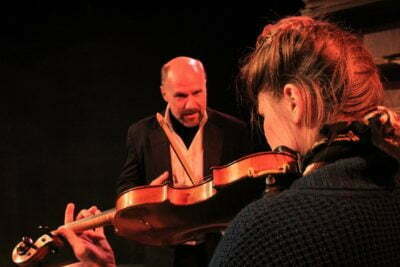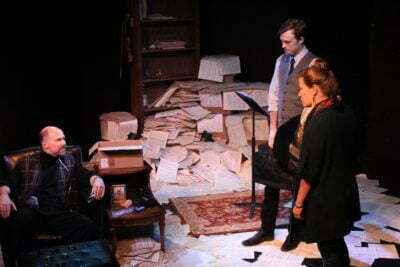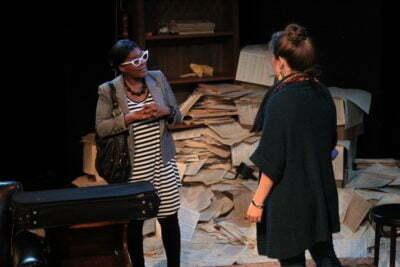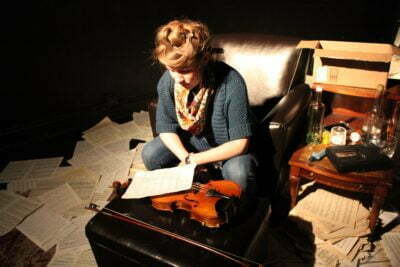Dust

By Rob Smith
Directed by Tara Branham
Produced by lower case theatre, Chicago
A Strong Drama from a Highly Motivated Team
If you can’t get your script produced, do it yourself. That’s the advice most commonly given to young, aspiring playwrights, but it’s no small feat. While there are a number of fringe festivals around that produce work in a jokey, collegiate atmosphere, making a production look professional takes a huge amount of time, effort, and borrowed or begged-for resources. Rob Smith is an experienced playwright, though, and clearly believed very strongly in his drama Dust, which is about the suppression of talent and analyzes what responsibilities an artist has to the world, their art, and themselves. He has evidently been working on the play, which was originally a one-act, for eight years, and created a company for it, lower case theatre. Now, he is fortunate to have found a production team that believes in the full-length version as strongly as he does, and is giving Dust a chance to be seen.

Our story concerns Lucia (Skyler Schrempp), a nearly broke bartender who is young, but old enough that her best friend Maddy (Patrice Foster) is married and expecting, while Lucia has no prospects, no ambition, unhappy living conditions, and a broken down car. One day, while giving her a ride, Maddy tells Lucia that her father is looking for her. Both women are confused and alarmed; Lucia ended her relationship with her father, Carver (Todd Michael Kiech), a world famous composer, on a very ugly note, and they’ve been estranged for all the years since. While a part of her would like nothing better than to visit Carver again just so she can reject him to his face one last time, another part of her knows she should avoid him entirely if she does not want to hurt herself as much as him. But when Carver mails her the precious violin she used to play, he hits her weak point. She cannot resist going to see what has provoked his interest at last.
The answer is that he is dying. His doctor, Ari Rosenberg (Adam M. Overberg), who remembers a quite happier Lucia, tells her that Carver has lung cancer, without any clear cause. The older man is on a ventilator, and he wants Lucia to once again take up her violin, to play at his funeral. She declines. Over the course of the play, we learn that Lucia was once a promising violinist who adored her father, and played to please him as much as herself. But after the death of her mother, another musician, Carver turned bitter and lost his inspiration, and his domination and spite made music bitter for Lucia, too. They never really resolved what the problem was, she just lost her motivation, and drifted out of his life. Because Lucia truly did love music, having to abandon it to feel free of her father has left her depressed ever since.

The concept of a child prodigy being pushed by an obsessive parent is a common one, and famous at least as far back as Mozart. However, Lucia was not a prodigy. She had immense talent, but needed to be driven to the brink of her endurance by her father to achieve her potential. She was receptive when he was benevolent, but when he turned, he twisted Lucia’s entire sense of identity and poisoned a talent she had taken pride in. What is brilliant about Smith’s play is that we’re never sure until the end whether the father and daughter will reconcile, or whether it would be good for them to do so. Conventionally, they should, but Schrempp and Kiech are such pained, stubborn, realistic figures, we know we cannot expect the conventional from them. Not only is there years of anger in their arguments, but director Tara Branham has infused their silences and quiet moments with disappointment and betrayal as well.
Though they play ancillary figures in Lucia and Carver’s lives, Foster and Overberg pour just as much effort into making their characters believable and worthy of attention. They seem better adjusted, but Maddy and Ari are not in this play solely to provide Lucia with someone to bounce dialogue off of. Ari is professionally satisfied in the career his parents chose for him, but lonely, and not completely over high school. Maddy loves her husband, but has had to make the best of teaching kids since Carver destroyed her musical career. Even without daddy issues, you can’t have it all. It’s a strong thematic point, although I got the feeling that most of the extensions to the play involved their scenes.

I take it as a good sign that the play is two hours long, and feels about right. Raquel Adorno has provided a quite lovely costume for Lucia that still feels appropriate for her job and income, and interesting, but appropriate and unflashy clothes for the other characters. Scenic designer Shaun Renfro has been bolder, by scattering the entire stage with discarded scores which cascade from a bookshelf in Carver’s living room. On one hand, it’s a clever representation of how mentally trapped Lucia is in Carver’s world, and allows the timeshifts to happen seamlessly (pay close attention to those costumes). On the other hand, the all-encompassing room makes some staging very awkward, particularly in an early scene in which Lucia and Maddy sit on the ground. The long-fought for production of Dust is overall quite strong though, and my biggest complaint is that the run is so short. Smith has a play to be proud of, and by producing it, reinforces Dust’s message about how deep-seated the artist’s need to create is.
Recommended
Jacob Davis
Playing at the Heartland Studio, 7016 N Glenwood Ave, Chicago.
